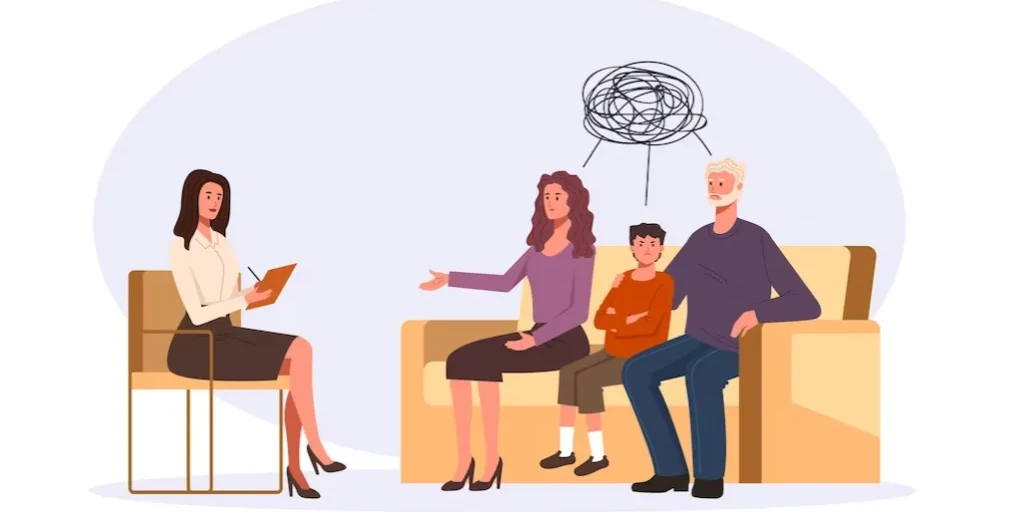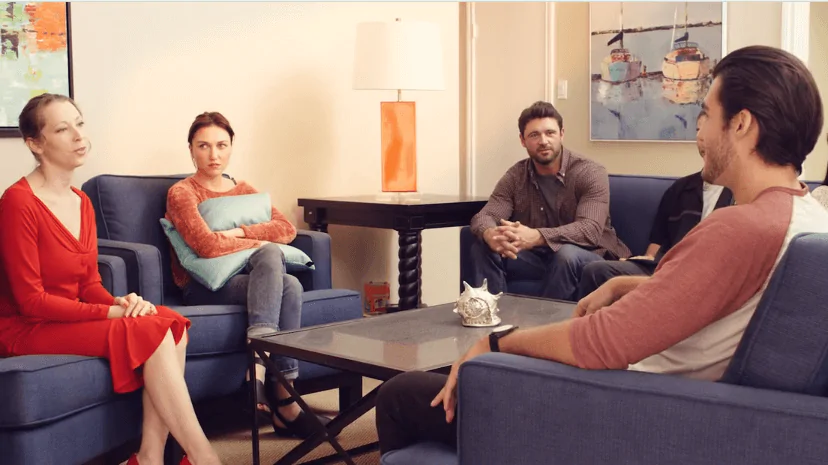24/7 Helpline:
(866) 899-221924/7 Helpline:
(866) 899-2219
Learn more about Depression Treatment centers in Clark County
Depression Treatment in Other Counties

Other Categories
Other Insurance Options

Holman Group

WellCare Health Plans

AllWell

MVP Healthcare

BHS | Behavioral Health Systems

Meritain

Excellus

Health Net

Regence

Aetna

ComPsych

Multiplan

EmblemHealth

Humana

UnitedHealth Group

Absolute Total Care

Cigna

Lucent

Group Health Incorporated

Covered California

Wooded Glen Recovery Center
Wooded Glen Recovery Center, located in Henryville, Indiana, is a luxury drug and alcohol rehab for ...

Southern Indiana Treatment Center
Southern Indiana Treatment Center is a private rehab located in Charlestown, Indiana. Southern India...

Pocono Mountain Recovery Center
The Pocono Mountain Recovery Center provides a full range of addiction treatment programs to those s...

South Shore Mental Health Center
South Shore Mental Health Center, in Charlestown, Rhode Island, is a mental health and dual diagnosi...

Innovative Counseling and Consulting
Innovative Counseling and Consulting is a drug and alcohol rehab and behavioral health center locate...

Harbor House
Harbor House - Alcohol and Drug Center offers inpatient treatment for men with substance abuse disor...

Synergy Treatment
Synergy Treatment is a drug and alcohol rehab located in Memphis, Tennessee. They provide residentia...

Baptist Rehabilitation – Outpatient
Baptist Rehabilitation – Outpatient is a private rehab located in Memphis, Tennessee. Baptist Rehabi...

Transformation Center and Associates
Transformation Center and Associates is a private rehab located in Memphis, Tennessee. Transformatio...

Memphis Center for Addiction Treatment
Memphis Center for Addiction Treatment is a private rehab located in Memphis, Tennessee. Memphis Cen...

Lighthouse Ministries
Lighthouse Ministries is a drug and alcohol rehab located in Memphis, TN. They provide outpatient ad...

Warriors Center
Warriors Center is a faith based drug and alcohol treatment center for men and women in Memphis, TN....

Serenity Recovery Centers
Serenity Recovery Centers is a drug and alcohol rehab located in Memphis, Tennessee. They provide re...

Compass Intervention Center
Compass Intervention Center is a drug and alcohol rehab center located in Memphis, TN. They provide ...

Behavioral Health Group (BHG) – Memphis
Behavioral Health Group (BHG) – Memphis is a private rehab located in Memphis, Tennessee. Behavioral...

Foundations Memphis
Foundations Memphis is a group-oriented outpatient program that provides day and evening program and...

Grace House – Primary House
Grace House - Primary House is located in Memphis, Tennessee. Grace House - Primary House is a treat...

Pyramid Recovery Center
Pyramid Recovery Center is a private rehab located in Memphis, Tennessee. Pyramid Recovery Center sp...

Mental Health Resources
Mental Health Resources is a private rehab located in Memphis, Tennessee. Mental Health Resources sp...

Memphis Recovery Centers
Memphis Recovery Centers is a drug and alcohol rehab located in Memphis, Tennessee. They provide out...

Crestwyn Behavioral Health Hospital
Crestwyn Behavioral Health Hospital, in Memphis, Tennessee, is a 12 step focused drug and alcohol re...

PAX Memphis
PAX Memphis is a drug and alcohol rehab located in Memphis, Tennessee. They provide intensive outpat...

First Step Recovery Centers
First Step Recovery Centers is a drug and alcohol rehab located in Memphis, Tennessee. They provide ...

MidSouth Sober Living
MidSouth Sober Living is a non-profit rehab located in Memphis, TN. MidSouth Sober Living specialize...

The Salvation Army – Purdue Center of Hope
The Salvation Army - Purdue Center of Hope is located in Memphis, Tennessee. The Salvation Army - Pu...

The HART Center
The HART Center is a private rehab located in Memphis, Tennessee. The HART Center specializes in the...

The Salvation Army – Adult Rehabilitation Center – ARC
The Salvation Army- Adult Rehab, located in Memphis, Tennessee, is a faith based residential work th...

Spero Health – Memphis
Spero Health – Memphis is a drug and alcohol rehab located in Memphis, Tennessee. They provide addic...

Memphis Alcohol and Drug Help
Memphis Alcohol and Drug Help is a private rehab located in Memphis, Tennessee. Memphis Alcohol and ...

Grace House – Residence for Recovering Women
Grace House - Residence for Recovering Women is located in Memphis, Tennessee. Grace House - Residen...

Saint Francis Hospital – Behavioral Health Services
Saint Francis Hospital Behavioral Health offers psychiatric treatment to adults and seniors in the M...






























































Lakeside Behavioral Health System – Dual Diagnosis
Lakeside Behavioral Health System – Dual Diagnosis is a rehab center that has decades of experience ...

Bartlett Therapy Center
Bartlett Therapy Center is a private rehab located in Memphis, Tennessee. Bartlett Therapy Center sp...

Youth Dimensions
Youth Dimensions is a private rehab located in Memphis, Tennessee. Youth Dimensions specializes in t...

Shelby County Schools – Mental Health Center
Shelby County Schools – Mental Health Center is a public rehab located in Memphis, Tennessee. Shelby...

East Memphis Therapy Center
East Memphis Therapy Center is a private rehab located in Memphis, Tennessee. East Memphis Therapy C...

Colonial Health Rehabilitation Center
Colonial Health Rehabilitation Center is a private rehab located in Memphis, Tennessee. Colonial Hea...

AA – Alcoholics Anonymous – Getwell Road
AA – Alcoholics Anonymous – Getwell Road is a non-profit rehab located in Memphis, Tennessee. AA – A...

Al – Anon and Al – Ateen
Al-Anon and Al-Ateen - Union Avenue offers outpatient services for families and loved ones of alcoho...

AA – Alcoholics Anonymous – Union Avenue
AA – Alcoholics Anonymous – Union Avenue is a non-profit rehab located in Memphis, Tennessee. AA – A...

Humanity United with God for Society
Humanity United with God for Society is a private rehab located in Memphis, Tennessee. Humanity Unit...

Life Enhancement Services
Life Enhancement Services is a private rehab located in Memphis, Tennessee. Life Enhancement Service...

Health Connect America
Health Connect America is a private rehab located in Memphis, Tennessee. Health Connect America spec...

ADC Recovery and Counseling Center
ADC Recovery and Counseling Center is a private rehab located in Memphis, Tennessee. ADC Recovery an...

Baptist Industrial Rehabilitation
Baptist Industrial Rehabilitation is a private rehab located in Memphis, Tennessee. Baptist Industri...

AA – Alcoholics Anonymous – Memphis
AA – Alcoholics Anonymous – Memphis is a non-profit rehab located in Memphis, Tennessee. AA – Alcoho...

AA – Alcoholics Anonymous – Helpline
AA – Alcoholics Anonymous – Helpline is a non-profit rehab located in Memphis, Tennessee. AA – Alcoh...

New Directions
New Directions is a drug and alcohol rehab located in Memphis, Tennessee. They provide both inpatien...

Lifetime Therapy Associates
Lifetime Therapy Associates is a private rehab located in Memphis, Tennessee. Lifetime Therapy Assoc...

Baby Love – Midtown Mental Health Center
Baby Love – Midtown Mental Health Center is a private rehab located in Memphis, Tennessee. Baby Love...

Detox West Tennessee
Detox West Tennessee is a private detox clinic located in Memphis, Tennessee. Detox West Tennessee s...

Mid South Alcohol and Drug Education Center
Mid South Alcohol and Drug Education Center is a private rehab located in Memphis, Tennessee. Mid So...

Memphis Rehabilitation Center
Memphis Rehabilitation Center is a private rehab located in Memphis, Tennessee. Memphis Rehabilitati...

Life Strategies Counseling
Life Strategies Counseling is a private rehab located in Memphis, Tennessee. Life Strategies Counsel...

CAAP – Cocaine and Alcohol Awareness Program
CAAP provides high quality behavioral health and co-occurring mental health services for those who a...

Whitehaven Mental Health Center – Drug and Alcohol Abuse
Whitehaven Mental Health Center – Drug and Alcohol Abuse is a private rehab located in Memphis, Tenn...

Urban Family Ministries
Urban Family Ministries is a private rehab located in Memphis, Tennessee. Urban Family Ministries sp...

Alcohol and Chemical Abuse Rehabilitation Center
Alcohol and Chemical Abuse Rehabilitation Center is a private rehab located in Memphis, Tennessee. A...

Grace House – Halfway House
Grace House - Halfway House is located in Memphis, Tennessee. Grace House - Halfway House is a treat...





















































































































































